Stephen was born at Gran (modern day Hungary). The son of Prince Geisa, the fourth Duke of the Huns of Hungary, had been converted to the Christian faith, along with his wife and several ministers. Throughout his lifetime, Prince Geisa labored to bring Christianity to his land. His wife, following a vision, told him that they would bear a son who would perfect the Christian work they had begun. They named him Stephen, and he was baptized by Saint Adalbert, bishop of Prague.
Stephen was educated in Italy, under the tutelage of Saint Adalbert, and resided at the court of a pious count. When he was fifteen years old, he returned home and his father gave him the commandment of his armies, seeing his virtue and Christian ardor. Stephen began to root out idolatry and transform the pagan customs still existing among the people. He also showed great generosity and care for the poor and suffering in the land, inspiring others to charitable works and service.
When Stephen was just 20, his father died, and he ascended to the throne. Immediately, the pagan nobility rebelled, fearing that Stephen would spread the faith of Christianity even further throughout the land. They killed Christian nobles, burned fields, and rose up to challenge the new king. Without hesitation, Saint Stephen marched upon the rebels, under the banners of Saint George and Saint Martin, and despite inferior forces, triumphed. In thanksgiving to the Lord, Stephen had a monastery constructed on the spot of victory—dedicated to Saint Martin—which is now referred to as the Holy Hill.
Stephen worked to establish Christianity throughout the country, forming the archbishopric at Gran. He petitioned the pope to support his actions in the name of God. Stephen founded monasteries and churches all over the land, and Pope Sylvester II appointed bishops to the eleven sees he had endowed, and bestowed upon him, for the greater success of his work, the title of king. Pope Sylvester II sent him a cross to be borne before him, saying that he regarded him as the true apostle of his people. In 1001, on the feast of the Assumption of Our Blessed Mother, he received a royal crown and was solemnly enthroned.
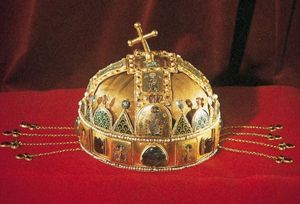 |
| The royal crown of Saint Stephen |
Despite his fierceness in battle, and his ardor and zeal for defending the faith against invasion and rebellion, no trait was more evident in Saint Stephen than his love and charity for the poor. It is said that because he visited those in need in their houses and washed their feet, his right hand has remained incorrupt since his death. He often went out in disguise to exercise his charities, moving amongst the poor and downtrodden, not wishing to be detected. One day, a band of beggars, not satisfied with the alms they received, threw him down, tore out handfuls of his hair and beard, and took his purse. He prayed to the Lord and thanked Him for an insult he would not have suffered from enemies, but accepted gladly from the poor who, he said to Him, “are called Your own, and for whom I can have only indulgence and tenderness.” He further prayed to Our Blessed Mother, to whom he was especially devoted, "Queen of heaven, see how your people have treated me whom you made king. If they were your enemies, I would have punished them. But since they are your Son's people, I will suffer this joyfully and say thank you for it."
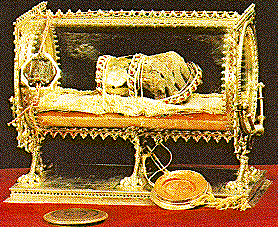 |
| The incorrupt hand of Saint Stephen |
Saint Stephen’s devotion was all-consuming. He placed his realms under the protection of our Blessed Lady—to whom he devoted Hungary-- and kept the feast of Her Assumption with great affection. Mary, the Mother of God, is considered the patroness of Hungary even today. Saint Stephen established just laws, and saw to their execution. All was done in service of the Lord, guided by the faith. While he spent a great deal of time in war, he only engaged in wars of defense—when Hungary was invaded multiple times, oftentimes by his relatives. In each case, he was victorious, sending missionaries into any captured lands, and spreading Christianity throughout the region.
Saint Stephen married the sister of the Emperor Saint Henry, Gisela, who was a worthy companion for him. From his marriage came a saintly son, the devout Emeric, an angel of purity, who died seven years before his father. Along with the death of Emeric, his other children died, one by one. Stephen bore all with perfect submission to the Will of God, however, embracing his trials, and doubling his time spent in prayer and meditation.
When Saint Stephen was about to die, he summoned his bishops and nobles, and told them to choose his successor. He urged them to nurture and cherish the Catholic Church, which was still a tender plant in Hungary, to follow justice, humility, and charity, to be obedient to the laws, and to show at all times a reverent submission to the Holy See. Then, raising his eyes towards heaven, he said: “O Queen of Heaven, August Restorer of a prostrate world, to Thy care I commend the Holy Church, my people, and my realm, and my own departing soul.” Saint Stephen died on his favorite feast day, the feast of the Assumption.
Throughout his life, Saint Stephen had Christ on his lips, Christ in his heart, and Christ in all he did. Today, on his feast day, we pray for the same devotion, the same fervor, the same guiding faith in all that we say, do, and feel. Saint Stephen, pray for us!
From the Roman Breviary:
St. Stephen introduced into Hungary both the Faith of Christ and the regal dignity. He obtained his royal crown from the Roman Pontiff; and having been, by his command, anointed King, he offered his kingdom to the Apostolic See. He built several houses of charity at Rome, Jerusalem, and Constantinople; and with a wonderfully munificent spirit of religion, he founded the Archiepiscopal See of Gran and ten other bishoprics. His love for the poor was equaled only by his generosity towards them; for, seeing in them Christ Himself, he never sent anyone away sad or empty-handed. So great indeed was his charity, that, to relieve their necessities, after expending large sums of money, he often bestowed upon them his household goods. It was his custom to wash the feet of the poor with his own hands, and to visit the hospitals at night, alone and unknown, serving the sick and showing them every charity. As a reward for these good deeds his right hand remained incorrupt after death, when the rest of his body had returned to dust.
He was very devoted to prayer: and would spend almost entire nights without sleep, rapt in heavenly contemplation; at times he was seen ravished out of his senses, and raised in the air. By the help of prayer, he more than once escaped in a wonderful manner from treasonous conspiracies and from the attacks of powerful enemies. Having married Gisela of Bavaria, sister of the Emperor St. Heinrich, he had by her a son, Emeric, whom he brought up in such regularity and piety as to form him into a saint. He summoned wise and holy men from all parts to aid him in the government of his kingdom, and undertook nothing without their advice. In sackcloth and ashes, he besought God with most humble prayer, that he might not depart this life without seeing the whole kingdom of Hungary Catholic. So great indeed was his zeal for the propagation of the Faith, that he was called the Apostle of his nation, and he received from the Roman Pontiff, both for himself and for his successors, the privilege of having the cross borne before them.
He had the most ardent devotion towards the Mother of God, in whose honor he built a magnificent church, solemnly declaring Her Patroness of Hungary. In return the Blessed Virgin received him into Heaven on the very day of Her Assumption, which the Hungarians, by the appointment of their Holy King, call "the day of the Great Lady." His sacred body, exhaling a most fragrant odor and distilling a heavenly liquid, was translated, by order of the Roman Pontiff, amidst many and divers miracles, to a more worthy resting-place, and buried with greater honor. Pope Innocent XI commanded his feast to be celebrated on September 2; on which day, Leopold I, Emperor elect of the Romans and King of Hungary, had, by Divine assistance, gained a remarkable victory over the Turks at the siege of Buda.
At the close of the 10th century, when anarchy had penetrated even into the sanctuary, hope sprang up once more on the day whereon the Holy Ghost chose the race of St. Stephen to renew the youth of the world. Satan, who thought that the Papacy was humiliated once for all, trembled with rage when he saw new laborers coming to St. Peter, as to the only foundation on which it is possible to build. The proudest family that had ever caused Rome to shake, asked of Her the right to be counted among the nations of the West. How true it is that the gates of Hell shall never prevail against the Rock, against the Church founded thereon.
Therefore we will hope, even against hope, in the future of the noble nation established by St. Stephen upon the Apostolic strength. The Sovereign of Hungary, the august Queen of Heaven, will not allow Her loyal subjects to continue to listen to the proposals of the infernal spirit. Apostle and King, St. Stephen, protect thy people, assist the Church, help us all.
Saint Stephen’s advice to his son Emeric: “My dearest son, if you desire to honor the royal crown, I advise, I counsel, I urge you above all things to maintain the Catholic and apostolic faith with such diligence and care that you may be an example for all those placed under you by God and that all the clergy may rightly call you a man of true Christian profession. Failing to do this, you may be sure that you will not be called a Christian or a son of the Church. Indeed, in the royal palace - after the faith itself - the Church holds second place, first propagated as she was by our head, Christ; then transplanted, firmly constituted and spread through the whole world by his members, the apostles and holy fathers. And though she always produced fresh offspring, nevertheless in certain places she is regarded as ancient.
However, dearest son, even now in our kingdom the Church is proclaimed as young and newly planted; and for that reason she needs more prudent and trustworthy guardians lest a benefit which the divine mercy bestowed on us undeservedly should be destroyed and annihilated through your idleness, indolence or neglect.
My beloved son, delight of my heart, hope of your posterity, I pray, I command, that at every time and in everything, strengthened by your devotion to me, you may show favor not only to relations and kin, or to the most eminent, be they leaders or rich men or neighbors or fellow-countrymen, but also to foreigners and to all who come to you. By fulfilling your duty in this way you will reach the highest state of happiness. Be merciful to all who are suffering violence, keeping always in your heart the example of the Lord who said: I desire mercy and not sacrifice. Be patient with everyone, not only with the powerful, but also with the weak.
Finally be strong lest prosperity lift you up too much or adversity cast you down. Be humble in this life, that God may raise you up in the next. Be truly moderate and do not punish or condemn anyone immoderately. Be gentle so that you may never oppose justice. Be honorable so that you may never voluntarily bring disgrace upon anyone. Be chaste so that you may avoid all the foulness of lust like the pangs of death.
All these virtues I have noted above make up the royal crown and without them no one is fit to rule here on earth or attain to the heavenly kingdom.”
Year 2: Day 228 of 365
Prayer Intentions: Christ in our hearts, on our lips, in our actions.
Requested Intentions: For personal family intentions, for the sick, poor, hungry, and homeless (G); Financial security and peace (J); Grace, peace, and obedience to the will of God in a marriage (H); Successful and blessed marriage for sin, freedom from anxiety for husband, spiritual contentedness for family (N); Employment and health for a husband (B); Recovery and health of a mother (J); For a family to grow closer to the Church, salvation for all children (D); Successful employment (L); Successful employment (S); Renewal of faith life (A); Support for an intended marriage, health for friend and aunt (J); Mental health assistance for son (G); Freedom from illness (S); Successful employment (C); Financial assistance and employment (B); For a family’s intentions (T); Successful examination results (B); Healing of a friend with cancer, for all those who help others (B); Healing and love (L); Grace and healing (V); Healing of a heart, consecration of a marriage (M); Health of a family, intentions of apostolate (H); For repentance (J); For a family in trouble (R); Healing, successful relationships for son, financial success (J); Success of a company (L); For a religious society (J); Healing of a husband, strength as a faithful caregiver (D); Healing of a son (T); Financial security, Healing and guidance (M); Healing of a heart and relationship (V); Employment for daughter (J); For a marriage that glorifies the Lord (K); Resolution of family situation, parents’ health (A); Positive results (C); For a son’s employment, faith, and relationships (S).
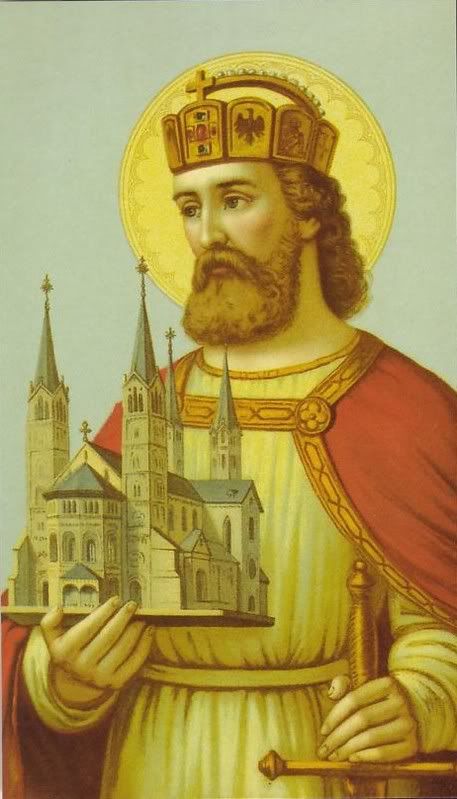

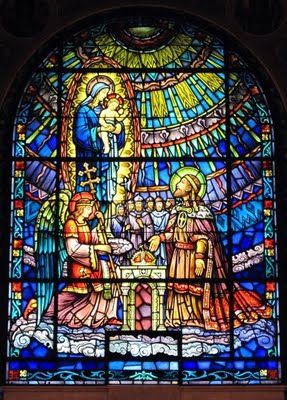

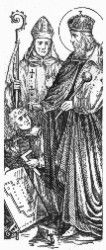














No comments:
Post a Comment
Thanks for leaving a comment. If you wish to submit a prayer request, however, please do so above, using the "Contact" tab.